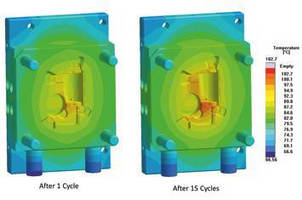Multi-Cycle Analysis Sets New Benchmark In Injection Molding Simulation

Using a completely 3D-approach and the integration of a highly developed thermal solver, the injection molding simulation software SIGMASOFT® allows the calculation of multiple consecutive production cycles, considering the thermal interactions throughout all the components in the mold. The accuracy of the entire simulation is thus dramatically increased.
Schaumburg, Illinois - SIGMA® Plastic Services presented its SIGMASOFT® software designed for 3D injection molding process simulation at the recent Euromold 2011, hall 8, stand A 101. One of the highlights of the presentation was the SIGMASOFT® unique functionality of its "multi-cycle analysis", a new benchmark in injection molding simulation.
"In conventional injection molding software, a fixed mold temperature is defined and the whole simulation is carried out under the assumption that this value remains constant over time", explained Dr. Marco Thornagel, Executive Director of SIGMA® Engineering. "In reality, however, you have a very complex thermal process taking place within the mold: the steel is cooled with a tempering system, the mold is heated when the hot polymer melt enters the cavity and there is a loss of thermal energy towards the surrounding environment. All governed by the heat transfer properties of the materials present throughout the system: polymer melt, runner system, inserts, mold, isolation materials. Only when these complex interactions are considered will the real production conditions be reproduced in the simulation. And our customers really appreciate that we already have 25 years of experience in how to make this kind of simulation, with a user friendly meshing algorithm," observed Dr. Thornagel.
The 3D-approach of SIGMASOFT® allows all the components in a mold, including all the thermal and physical properties of each one of them, to be exactly reproduced. Therefore, the heat transfer process can be accurately calculated between each one of the components.
To accurately simulate the production conditions, the heat transfer process taking place in reality must be exactly reproduced in the simulation. This includes the heat-up during the start-up of the machine, when the mold is heated from room temperature to its production conditions (typically between 60º and 120°C) by the tempering system. It also includes the warming up produced by the hot polymer melt over several consecutive pre-production cycles, as happens in actual run conditions.
SIGMASOFT® is able to exactly reproduce the heat-up stage, as well as simulate the thermal evolution of the mold over multiple consecutive production cycles. This accurate calculation predicts the real temperature in each location of the mold during production, producing a condition that more closely reflects reality for the polymer as it sets inside the cavity. This allows the software, for example, to predict how long the polymer remains in a fluid condition so that post-pressure can be applied, or where will the thermally induced deformation most likely compromise the part quality.
Another of the advantages of multi-cycle simulation is the possibility to calculate how many production cycles are required for the mold to achieve cyclic equilibrium - and thus consistent quality conditions over a production run. Therefore, the number of parts required before the actual production begins can be more accurately predicted. The system can be optimized to minimize the number of pre-production parts that are required. Another possibility is to compare the efficiency of different tempering systems to understand how to achieve equilibrium more quickly or how to consume less energy.
SIGMA® (www.sigmasoft.de) is 100% owned by MAGMA® (www.magmasoft.de), the world market leader in casting process simulation technology based in Aachen, Germany. Our SIGMASOFT® process simulation solution optimizes the manufacturing process for injection molded plastic components. SIGMASOFT® combines the 3D geometry of the parts and runners with the complete mold assembly and temperature control system and incorporates the actual production process to develop a turnkey injection mold with an optimized process.
At SIGMA® and MAGMA®, our goal is to help our customers achieve required part quality during the first trial. The two product lines - injection molded polymers and metal castings - share the same 3D simulation technologies focused on the simultaneous optimization of design and process. SIGMASOFT® thus includes a variety of process-specific models and 3D simulation methods developed, validated and constantly improved for over 25 years. A process-driven simulation tool, SIGMASOFT®, with its comprehensive simulation approach, provides a tremendous benefit to production facilities. Imagine your business when every mold you build produces required quality the first time, every time. That is our goal. This technology cannot be compared to any other conventional "Design" simulation approach employed in plastics injection molding.
New product success requires a different communication between designs, materials, and processes that design simulation is not meant for. SIGMASOFT® provides this communication. SIGMA® support engineers, with 450 years of combined technical education and practical experience, can support your engineering goals with applications specific solutions. SIGMA® offers direct sales, engineering, training, implementation, and support, by plastics engineers worldwide.
For further information on this announcement, interested parties should contact:
Christof Heisser or Matt Proske
SIGMA Plastic Services, Inc.
10 N. Martingale Road, Suite 425
Schaumburg, Illinois 60173
USA
Phone: +1 847 558 5600
Email: cheisser@3dsigma.com or mproske@3dsigma.com
Web: www.3dsigma.com




